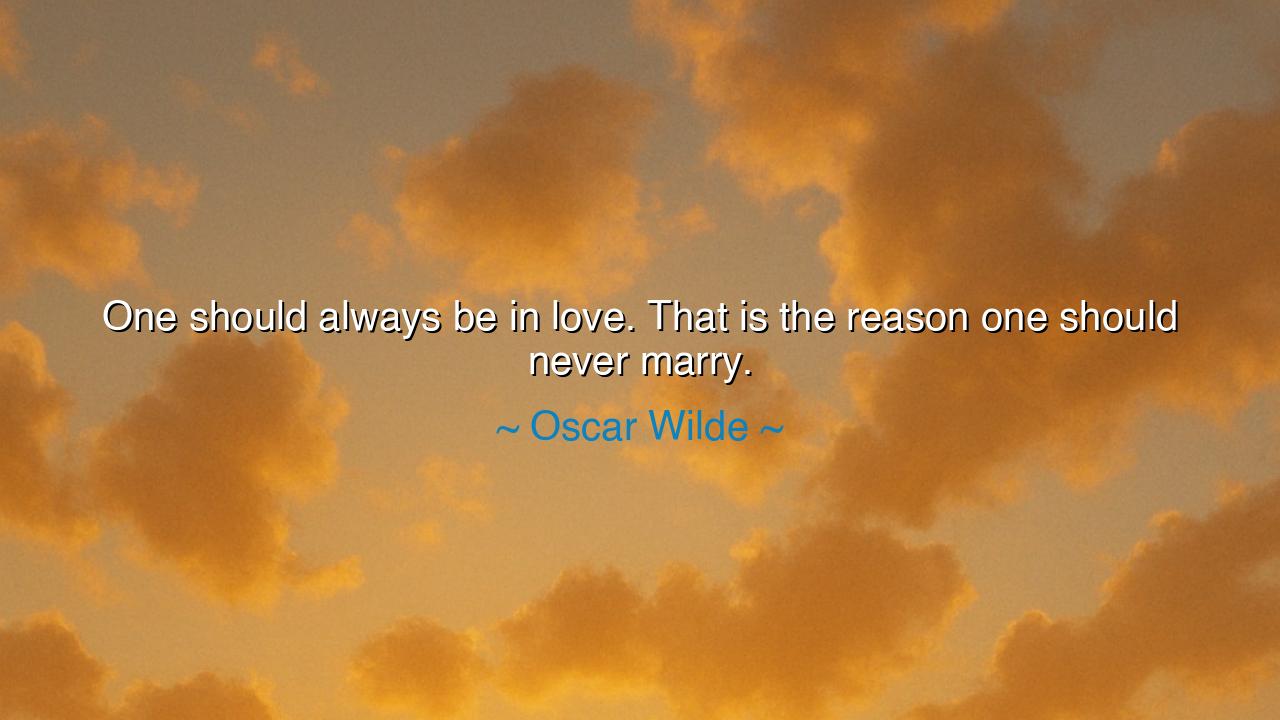
One should always be in love. That is the reason one should never






"One should always be in love. That is the reason one should never marry." Thus spoke Oscar Wilde, master of wit and paradox, who clothed truth in garments of jest. To the unthinking, these words may seem to mock both love and marriage, but to the discerning ear, they contain a profound reflection on the nature of desire and the fleeting fire of passion. Wilde, who lived in a society bound by rigid conventions, knew that love was a force too wild, too radiant, to be easily contained by the institution of marriage as it was then understood.
The origin of this wisdom comes from Wilde’s rebellion against the ordinary and the predictable. To him, love was not simply an arrangement of duty, but the intoxication of spirit, the trembling of the heart, the divine madness that lifts mortal men into the realm of poetry and dream. Marriage, however, he saw as society’s attempt to tame this wildness, to transform the fire of passion into the routine of custom, to cage the soaring bird of love within the narrow bars of obligation. In his paradox, he reminds us that the essence of love lies in its freedom, its unpredictability, its eternal newness.
Consider the tale of Héloïse and Abelard, whose love in the 12th century shook the walls of convent and cloister alike. Their passion was fierce, their letters filled with longing and fire. Yet when their union was bound in secret marriage, tragedy followed: the world condemned, their love was torn by duty and separation. In their story lies the truth Wilde sought to capture: that love, when forced into the mold of rigid expectation, may lose its wings and fall into sorrow. Their passion, eternal in spirit, became chained by circumstance.
Wilde does not command us to despise marriage, but rather to remember that love must remain ever alive, ever unchained by the weight of routine. How many unions begin with fire, yet cool into embers because those within them forget to remain in love? They keep the form but lose the spirit; they preserve the bond but not the beauty. Wilde’s jest is a warning: beware of mistaking the ceremony for the feeling, the contract for the passion.
And yet, there is also a heroic reading of his words. To “always be in love” is to live as a poet lives: with open heart, with eyes that see beauty in all things, with a spirit that refuses to grow cold. For Wilde, love was not merely between two souls—it was a way of being, a flame that could ignite one’s art, one’s friendships, one’s very life. To be “married” in the rigid sense was, in his mind, to risk losing that boundless spirit, to trade eternal spring for the repetition of winter days.
The lesson, then, is not to scorn marriage, but to guard the eternal flame of love within it. If you marry, let it not be the death of passion, but the renewal of it. Refuse to let routine smother the poetry in your union. Continue to woo, continue to wonder, continue to see the beloved as though for the first time. In this way, one may reconcile Wilde’s paradox: to be married, yet to remain always in love.
What practical steps shall we take? Speak words of affection daily, as though you were still courting. Seek beauty in the beloved, not only in their greatness, but also in their smallest gestures. Guard against complacency, for it is the thief of passion. And above all, keep the soul awake to wonder—read poetry, walk under the stars, dance even in silence. These are the tools by which love remains living, not stagnant.
So let Wilde’s paradox echo in your heart: one should always be in love, for love is life itself. But beware of letting any bond, whether called marriage or duty, suffocate the spirit of it. Love must remain untamed, renewed each day by the courage to see beauty again and again. Thus shall you live not only bound to another, but bound forever to the wonder of being alive.






AAdministratorAdministrator
Welcome, honored guests. Please leave a comment, we will respond soon